Readings Newsletter
Become a Readings Member to make your shopping experience even easier.
Sign in or sign up for free!
You’re not far away from qualifying for FREE standard shipping within Australia
You’ve qualified for FREE standard shipping within Australia
The cart is loading…






One of the key doctrines of the philosophy of Thomas Aquinas is his definition of truth as adaequatio intellectus et rei. The aim of this study is to make clear that the medieval doctrine presents the essential meaning of the term ‘truth’. Thomas’ doctrine of truth is developed in his Quaestiones disputatae de veritate. Only careful analysis of the first quaestio allows a precise formulation of the classical definition of truth. For only after Thomas’ doctrine of truth has been integrated into his ontology and his theory of meaning, can the meanings of adaequatio, intellectus and res be understood. After reconstructing Thomas’ theory of truth, the author turns to Kant’s discussion of traditional notions of truth. Kant’s doctrine is taken as representative of that of a number of modern thinkers, as he is held to be the founder of the coherence theory of truth (as against the correspondence theory). An analysis of Kant’s critique leads to the unexpected realisation that he maintains the classical definition. The study of selected texts throws light on the much discussed continuity between medieval and modern thought.
$9.00 standard shipping within Australia
FREE standard shipping within Australia for orders over $100.00
Express & International shipping calculated at checkout
One of the key doctrines of the philosophy of Thomas Aquinas is his definition of truth as adaequatio intellectus et rei. The aim of this study is to make clear that the medieval doctrine presents the essential meaning of the term ‘truth’. Thomas’ doctrine of truth is developed in his Quaestiones disputatae de veritate. Only careful analysis of the first quaestio allows a precise formulation of the classical definition of truth. For only after Thomas’ doctrine of truth has been integrated into his ontology and his theory of meaning, can the meanings of adaequatio, intellectus and res be understood. After reconstructing Thomas’ theory of truth, the author turns to Kant’s discussion of traditional notions of truth. Kant’s doctrine is taken as representative of that of a number of modern thinkers, as he is held to be the founder of the coherence theory of truth (as against the correspondence theory). An analysis of Kant’s critique leads to the unexpected realisation that he maintains the classical definition. The study of selected texts throws light on the much discussed continuity between medieval and modern thought.